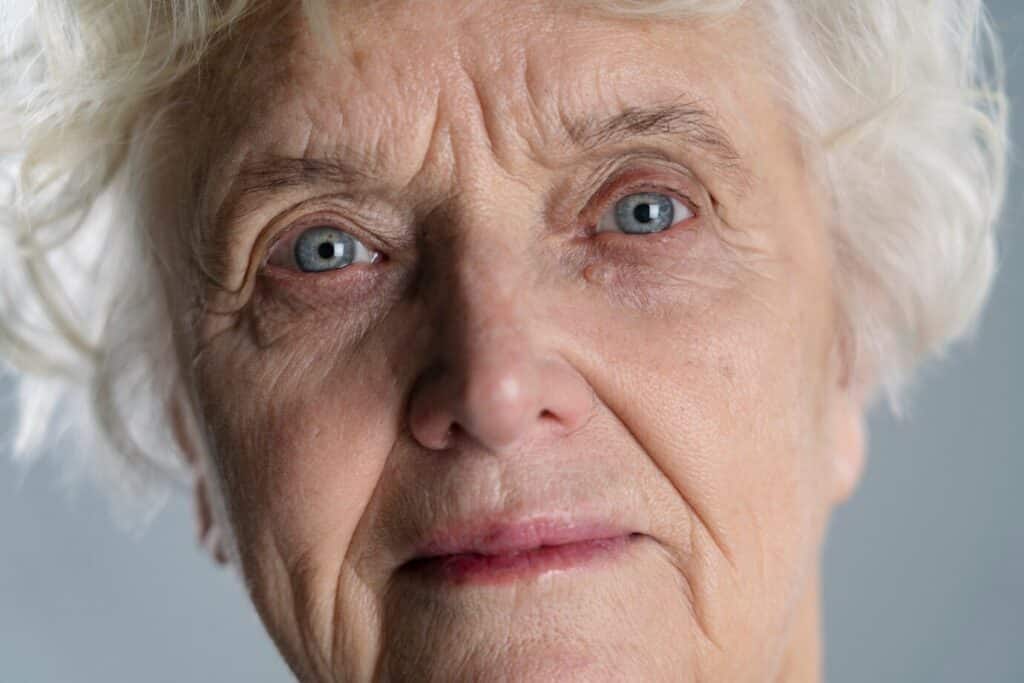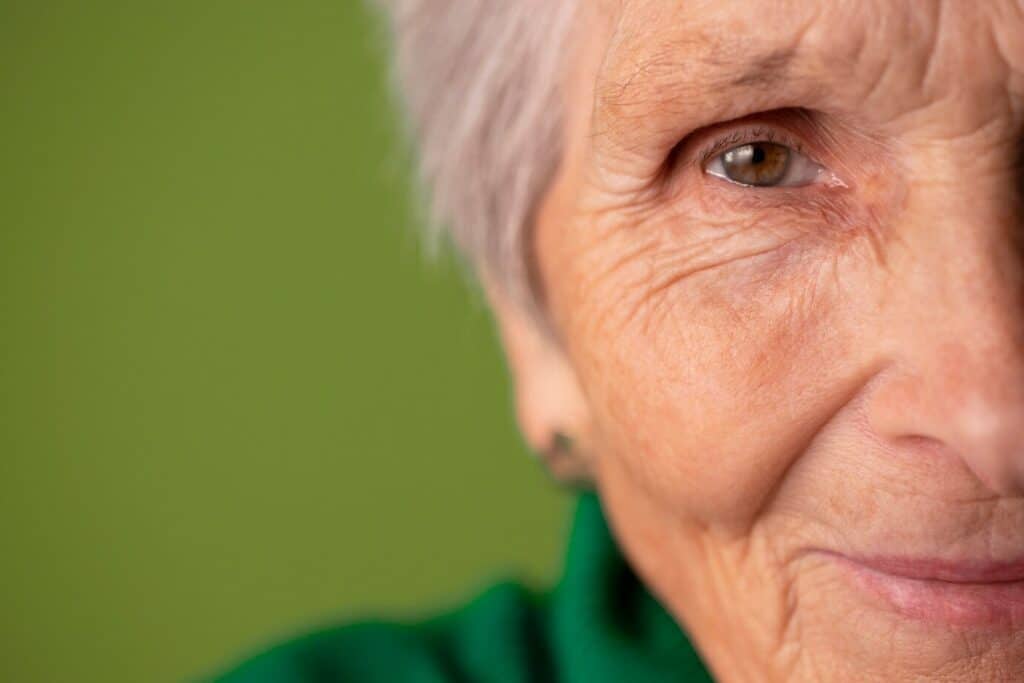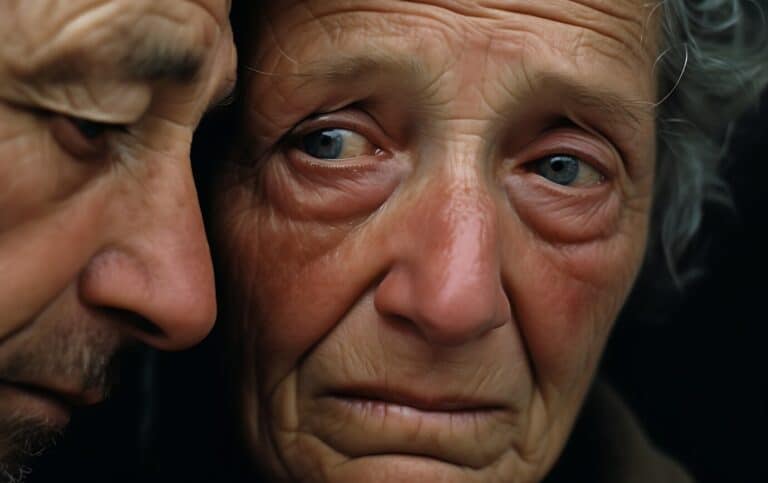As you care for a loved one with dementia, you may have noticed changes in their eyes or vision. You might wonder, “Does dementia make the eyes look different?” The answer is complex, and understanding the relationship between dementia and eyesight can help you better support your loved one. Westmont of San Jose is committed to providing high-quality care and education for individuals with dementia and their families. This article by Westmont of San Jose explores how dementia affects the eyes, common eye conditions linked to dementia, and how you can support your loved one’s vision health.
What happens to your eyes when you have dementia?
As you navigate the complexities of dementia, it’s necessary to understand how this condition affects your eyes and vision. Dementia develops from the degeneration of neurons (brain cells) or changes in how neurons function, resulting in cognitive decline. When we see, our eyes take in information from the objects surrounding us. Light reflects into our eyes, which feed into the lens, the retina, and the optic nerve. The optic nerve transmits information from the retina to the brain, and our brain then processes this information.
Neural degeneration can affect the parts of your brain that process sight. Although it’s possible to have dementia and healthy eyes, the degeneration of your neurons might make it more difficult to see. Dementia and vision problems might also co-occur because both conditions are more common among older adults. Age-related vision loss can develop from conditions like macular degeneration and cataracts.
What Level of Care Do You Need?
Discover the level of care you or your family member requires.
Changes in Pupil Size and Reaction
To understand how dementia affects your eyes, examining changes in pupil size and reaction is crucial. In people with dementia, pupils may become smaller or larger than usual, affecting the amount of light that enters the eye. This can impact your ability to see clearly, especially in low-light environments.
Altered Eye Movement and Tracking
It happens when the brain struggles to process visual information, leading to eye movement and tracking difficulties. This can cause issues following moving objects, reading, or recognizing familiar faces.
Altered eye movement and tracking can significantly impact daily life. For instance, you might struggle to follow a conversation, read a book, or even recognize your loved ones. It is necessary to address these issues with your healthcare provider to develop coping strategies.
Facial Signs of Dementia
Even though you can’t tell whether someone has dementia by looking in their eyes or at their face, some facial signs may indicate the presence of dementia. For example, their facial expressions might seem inappropriate for specific situations. They might laugh in serious situations or cry without a discernible cause. They might also need clarification.

Facial Signs of Dementia
Changes in Eyelid Movement and Blinking
In addition to facial expressions, you might notice eyelid movement and blinking changes. People with dementia may have slower or faster blinking rates, or their eyelids may droop or twitch more frequently. These changes can be subtle, but they can indicate underlying neurological changes.
Altered Facial Expressions and Emotional Responses
The facial expressions of people with dementia may not always match their emotional state. They might appear depressed, frustrated, or angry, even without experiencing those emotions. Their nonverbal body language, such as facial expressions or gestures, can also be misinterpreted.
Plus, people with dementia may have difficulty recognizing and expressing emotions, which can lead to inappropriate emotional responses. For instance, they might laugh at a sad news story or become agitated in a calm environment. Understanding these changes in facial expressions and emotional reactions can help you better communicate with and support your loved one.
As How Eyes Can Change with Alzheimer’s and Dementia, it’s crucial to recognize these facial signs of dementia to provide the necessary care and support. If you’re concerned about your loved one’s cognitive decline, don’t hesitate to contact a doctor or a memory care community like Westmont of San Jose, located in Milpitas, CA, and can be contacted at 408-770-9575.
What eye conditions are linked to dementia?
Research has identified specific eye conditions associated with dementia. While more studies are needed to understand the link between dementia and visual impairment, some eye conditions are linked to an increased risk of dementia.
Age-Related Macular Degeneration (AMD)
The degeneration of the macula, the part of the retina responsible for central vision, can lead to Age-Related Macular Degeneration (AMD). Research has found that AMD, when combined with other health conditions such as stroke, heart disease, diabetes, high blood pressure, and depression, is linked to an increased risk of dementia.

Age-Related Macular Degeneration (AMD)
Cataracts and Dementia Risk
An eye condition that clouds the natural lens of the eye, cataracts are associated with a higher risk of dementia. However, it’s unclear whether cataracts cause dementia or vice versa or if a third mediating factor is at play.
Understanding the relationship between cataracts and dementia is crucial. A 2021 study found that cataracts, along with diabetes-related eye disease, were associated with an increased risk of dementia. Additionally, a study published in the UK Biobank found that cataract surgery was linked to a lower risk of dementia. While the exact mechanism is unclear, it’s crucial to speak with an eye doctor regularly if you or a loved one has dementia to detect and correct possible eye problems, which can improve your quality of life. For example, Posterior cortical atrophy: a dementia that affects the vision is a rare form of dementia that affects the brain’s ability to process visual information.
Do not forget that maintaining healthy vision and correcting vision problems can help you maintain a high quality of life, especially if you have dementia. If you’re concerned about your vision or a loved one’s vision, don’t hesitate to reach out to an eye doctor or a healthcare professional at Westmont of San Jose, located in Milpitas, CA, and can be reached at 408-770-9575.
Hallucination vs. Vision Change in Dementia
Unlike other symptoms of dementia, vision changes can be particularly challenging to distinguish from hallucinations. According to the American Academy of Ophthalmology (AAO), “Alzheimer’s Disease, Dementia and the Eye” are closely linked, and understanding this connection is crucial for adequate care.
Distinguishing Between Visual Hallucinations and Real Vision Changes
A vital step in managing dementia care is to differentiate between visual hallucinations and actual vision changes. For instance, a person with dementia may try to hold an object that appears closer than it is due to compromised depth perception, which can be mistaken for a hallucination. Similarly, they may struggle to recognize someone due to vision impairment, leading to misidentification.

Visual Hallucinations and Real Vision Changes
Managing Hallucinations and Vision Changes in Dementia Care
With proper care and attention, you can help manage hallucinations and vision changes in your loved one with dementia. This includes regular eye exams to detect and correct any underlying vision problems and create a safe, comforting environment that minimizes confusion and anxiety.
Hallucinations can be distressing for both the person with dementia and their caregivers. By understanding the underlying causes of these symptoms and addressing any potential vision changes, you can help reduce the frequency and severity of hallucinations. Additionally, working with healthcare professionals to develop a personalized care plan can help ensure your loved one receives the support they need to maintain a high quality of life. At Westmont of San Jose, our experienced team is dedicated to providing compassionate and comprehensive dementia care, including managing hallucinations and vision changes. Contact us at 408-770-9575 to learn more about our services.
Find Where You Belong
Dive into the vibrant life our Westmont communities have to offer.
Conclusion
With these considerations, it’s clear that dementia can affect the eyes and vision in various ways. While you can’t tell if someone has dementia just by looking in their eyes, vision loss is a common occurrence among people with dementia. Maintaining healthy vision and correcting vision problems can significantly improve your quality of life, especially if you have dementia. If you’re concerned about your or a loved one’s vision or cognitive health, don’t hesitate to contact a doctor or eye specialist at Westmont of San Jose, located in Milpitas, CA, and reachable at 408-770-9575. By staying informed and proactive about dementia eyes, you can take steps towards a better understanding and management of this complex condition.


